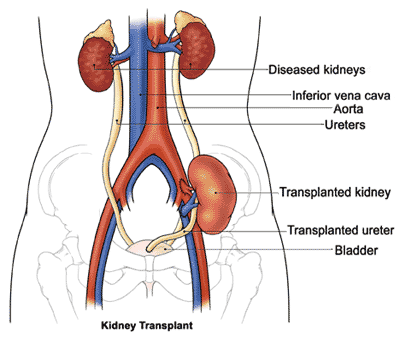End-stage renal disease (ERSD) cannot be treated with conventional medical treatments such as drugs. Dialysis and kidney transplantation are the only treatments for this condition.
Dialysis is the term for several different methods of artificially filtering the blood. People who require dialysis are kept alive but give up some degree of freedom due to their dialysis schedule, fragile health, or both.
Kidney transplantation means replacement of the failed kidneys with a working kidney from another person, called a donor. Kidney transplantation is not a complete cure, although many people who receive a kidney transplant are able to live much as they did before their kidneys failed. People who receive a transplant must take medication and be monitored by a physician who specializes in kidney disease (nephrologist) for the rest of their lives.




